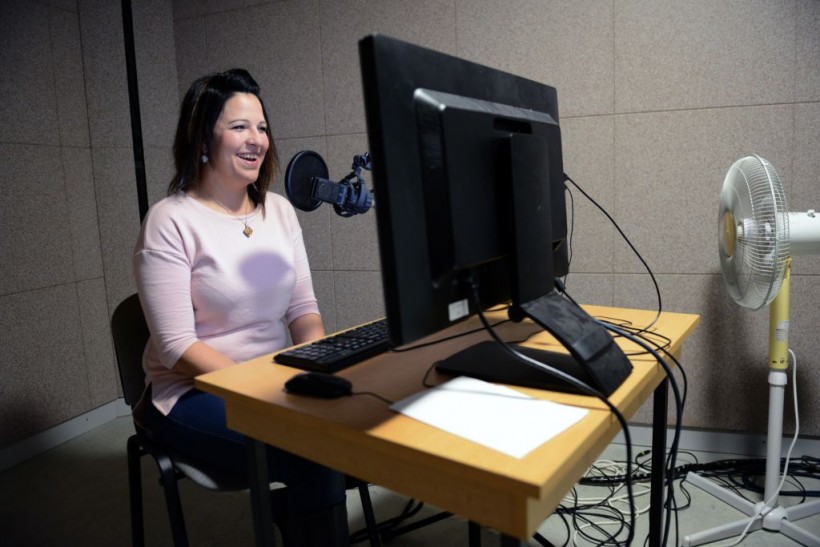Researchers from the Lithuanian University of Health Sciences (LSMU) and Kaunas University of Technology Faculty of Informatics (KTU IF) have developed a new alternative voice evaluation index that can rapidly and effectively identify disorders in patients' voices with the help of artificial intelligence (AI), as per Interesting Engineering's report.
The new index could help determine voice pathologies - a range of disorders including swelling, paralysis, and spasms in the vocal cords.

(Photo : MICHAL CIZEK/AFP via Getty Images)
The voice of Jana Huttova is recorded in a studio at the Pilsen university on November 07, 2018 , in Plzen. - A technology uses recordings of a patient's voice to create synthetic speech that can be played on their mobile phones, tablets or laptops via the app for patients set to lose their voice due to a laryngectomy, or removal of the larynx.
Laryngectomy
A laryngectomy is a procedure that involves removing the larynx. Sound is created in this area of the throat, which connects the mouth, nose, and lungs.
Speaking, swallowing, and breathing are all impacted by the operation. It is a procedure carried out when a patient has advanced laryngeal cancer, considerably impairing the voice.
To remove a malignant laryngeal tumor, these types of surgeries frequently necessitate the loss of one or both vocal cords, and occasionally the entire larynx. This results in a patient using what the researchers refer to as a "substitute voice," which is the portion of the laryngeal structure still there after the operation.
The research team noted that following surgery, the patient's voice and speech quality deteriorate, making communication more challenging.
Acoustic Substitution Voice Index
The team developed an AI-based method to evaluate a patient's substitute voice following a laryngectomy due to cancer. Using AI signal processing, the team was able to identify whether a patient had vocal disorders.
The study gave rise to the team's discovery called the Acoustic Substitution Voice Index (ASVI). The index will enable them to assess each patient's "substitute" voice following laryngeal cancer or oncological laryngitis.
The acoustic voice signal characteristics were combined with artificial intelligence methods to thoroughly assess vocal cord disorders.
"Until now, in medical practice, there was no suitable method to objectively and quantitatively evaluate the "substitute" voice. Our proposed ASVI algorithm allows the evaluation process to be done automatically in a concise time," Virgilijus Ulozas, professor at the Lithuanian University of Health Sciences (LSMU), said in a statement.
Future Use
If there are noticeable changes in the voice, the team hopes that patients will be able to do their own voice tests at home without the requirement for a medical facility in the future, enabling people to assess any vocal alterations early on.
The Acoustic Substitution Voice Index's initial clinical studies have yielded promising results, and researchers plan to eventually turn the ASVI into a mobile app that doctors and patients can use. Users may immediately examine changes in the voice by uploading an audio recording.
The researchers reported their findings in the journal Applied Sciences.
Related Article: AI Can Now Determine Human's Response to Drug Compounds, Applicable for Medicine Development






